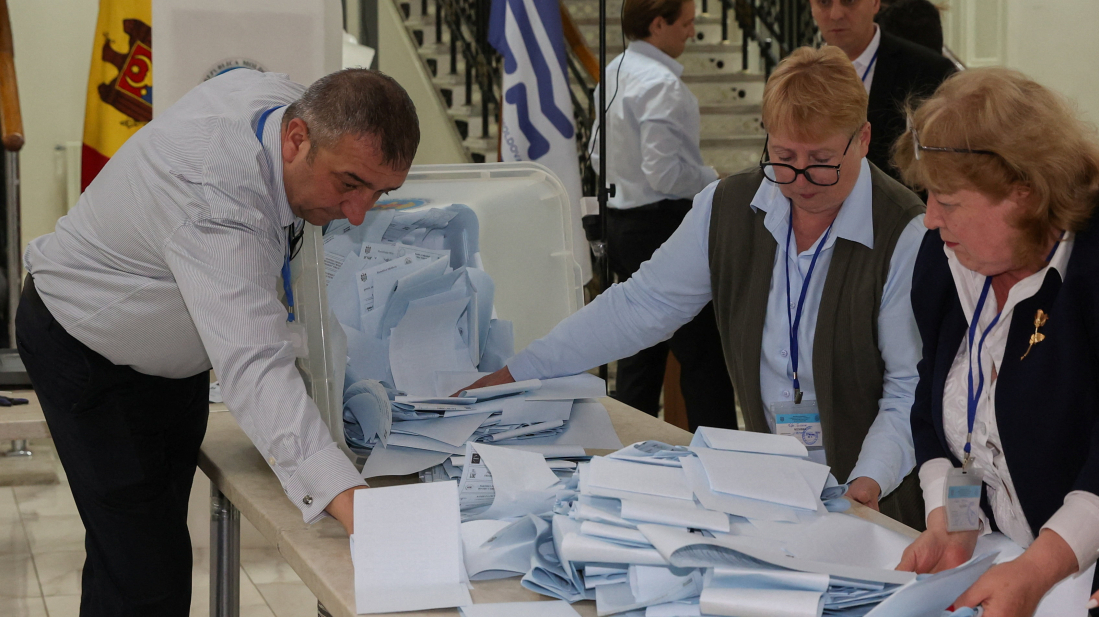live Israeli military says it has launched fresh strikes on Tehran: All the latest news on the Iran strikes
The Israeli military has begun a new wave of strikes on Tehran, it said late on Monday. The strikes came after it issued...

With more than 99.9% of ballots counted, Moldova’s pro-European ruling party, the Party of Action and Solidarity (PAS), held on to its parliamentary majority after Sunday’s pivotal election, strengthening the 2.4 million-strong country’s push towards the EU and away from Moscow.
With 100% of votes counted, Moldova’s pro-European ruling party, the Party of Action and Solidarity (PAS), led by President Maia Sandu, has retained its parliamentary majority, strengthening the 2.4 million-strong country’s push towards the EU and away from Moscow.
PAS received 50.20% of the vote (792,557 votes), putting it on track to secure a majority in parliament. The Patriotic Bloc (“Blocul Patriotic”), led by former president Igor Dodon, came second with 24.17% (381,505 votes). Other parties expected to enter parliament include the Alternative bloc (7.96%), Our Party (6.20%), and Democracy at Home (5.62%). Other parties failed to surpass the 5% threshold.
The total voter turnout was 52%, with protocols from all 2,274 polling stations processed. The results ensure PAS can form a government without a fragile coalition, keeping Moldova’s EU integration bid on track — a process requiring years of legislative effort.
Gratitude and acrimonious buildup
After the results were confirmed, President Sandu held a press conference, saying:
"I wanted Moldovans to choose Moldova, and I am glad that Moldovans made a decision for Moldova, despite all the interventions and money spent by Moscow. I am glad that our European path is safe. The future government is obliged to work with the same care for every citizen, regardless of how they voted."
The buildup to the vote, described by PAS leaders as the most consequential since Moldova’s independence, was marred by accusations of foul play from both sides. Sandu’s government warned Moldovans that Russia had attempted to sway the vote through widespread disinformation and vote-buying. Stanislav Secrieru, Sandu’s national security adviser, reported cyber attacks on election infrastructure and government websites, along with fake bomb threats called in to polling stations in Moldova and abroad. Moscow has denied any meddling.
Meanwhile, Igor Dodon called for protests outside parliament the following day, claiming Sandu planned to annul the vote — though no evidence was provided. Authorities will monitor closely to see whether Dodon follows through and the size of crowds he can mobilise.
In the days leading up to the election, officials barred two pro-Russian parties from the ballot amid allegations of illegal financing. Authorities warned of attempts to stir unrest following the vote, blaming Russian-backed disruption efforts if the election did not go in the Patriotic Bloc’s favour.
Economic context
Moldova — a former Soviet republic squeezed between Ukraine and Romania — has long vacillated between Russia and Europe. Opposition groups sought to exploit voter frustration over economic hardships and slow reforms, worsened by disinformation campaigns. Inflation remains high at around 7%, and energy costs are elevated due to reliance on imports.
Despite these pressures, PAS’s victory demonstrates that its platform of European integration and breaking with Russian influence still resonates widely among voters. The result marks a significant achievement for Sandu, who has staked her presidency on a pro-European course and accused Russia of deploying unprecedented tactics to sway voters in the impoverished country.
Follow the latest developments and global reaction after the U.S. and Israel launched “major combat operations” in Iran, prompting retaliation from Tehran.
Saudi Arabia’s state oil giant Saudi Aramco closed its Ras Tanura refinery on Monday following an Iranian drone strike, an industry source told Reuters as Tehran retaliated across the Gulf after a U.S.-Israeli attack on Iranian targets over the weekend.
The Kremlin is utilising the recent United States and Israeli military strikes on Iran to validate its ongoing war in Ukraine. Russian officials are pointing to the escalation in the Middle East as evidence that Western nations do not adhere to international rules.
The Middle East crisis intensifies after the deadly attack on the compound of the Supreme Leader of Iran Ali Khamenei on Saturday that killed him, other family members and senior figures. Iran has launched retaliatory strikes on U.S. targets in the region.
Ayatollah Alireza Arafi has moved into a pivotal constitutional role following the death of Supreme Leader Ayatollah Ali Khamenei, becoming the clerical member of Iran’s temporary leadership council under Article 111 of the Constitution of the Islamic Republic of Iran.
Former U.S. President Bill Clinton told lawmakers that President Donald Trump told him he had "some great times" with convicted sex offender Jeffrey Epstein before their relationship soured, according to a video released on Monday (2 March).
The U.S.-Iran crisis has entered its third day, with further strikes reported across the Middle East and the death toll rising. Oil prices have surged to levels last seen during the Covid-19 pandemic, raising fears of economic disruption and higher prices worldwide.
The UK said it's allowing the U.S. to use its bases for defensive strikes against Iran amid escalating missile attacks, after a suspected drone strike hit a British airbase in southern Cyprus, causing limited damage.
The Kremlin is utilising the recent United States and Israeli military strikes on Iran to validate its ongoing war in Ukraine. Russian officials are pointing to the escalation in the Middle East as evidence that Western nations do not adhere to international rules.
European Union stands with its member states in the face of any threat, EU Commission President Ursula von der Leyen said in response to the drone strike that hit Britain's Royal Air Force base of Akrotiri in southern Cyprus overnight.
You can download the AnewZ application from Play Store and the App Store.

What is your opinion on this topic?
Leave the first comment